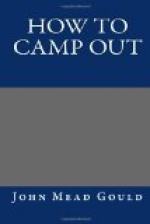Avoid all nonsensical waste of strength, and gymnastic feats, before and during the march; play no jokes upon your comrades, that will make their day’s work more burdensome. Young people are very apt to forget these things.
Let each comrade finish his morning nap. A man cannot dispense with sleep, and it is cruel to rob a friend of what is almost his life and health. But, if any one of your party requires more sleep than the others, he ought to contrive to “turn in” earlier, and so rise with the company.
You have already been advised to take all the rest you can at the halts. Unsling the knapsack, or take off your pack (unless you lie down upon it), and make yourself as comfortable as you can. Avoid sitting in a draught of air, or wherever it chills you.
If you feel on the second morning as if you could never reach your journey’s end, start off easily, and you will limber up after a while.
The great trouble with young people is, that they are ashamed to own their fatigue, and will not do any thing that looks like a confession. But these rules about resting, and “taking it easy,” are the same in principle as those by which a horse is driven on a long journey; and it seems reasonable that young men should be favored as much as horses.
Try to be civil and gentlemanly to every one. You will find many who wish to make money out of you, especially around the summer hotels and boarding-houses. Avoid them if you can. Make your prices, where possible, before you engage.
Do not be saucy to the farmers, nor treat them as “country greenhorns.” There is not a class of people in the country of more importance to you in your travels; and you are in honor bound to be respectful to them. Avoid stealing their apples, or disturbing any thing; and when you wish to camp near a house, or on cultivated land, obtain permission from the owner, and do not make any unreasonable request, such as asking to camp in a man’s front-yard, or to make a fire in dry grass or within a hundred yards of his buildings. Do not ask him to wait on you without offering to pay him. Most farmers object to having people sleep on their hay-mows; and all who permit it will insist upon the rule, “No smoking allowed here.” When you break camp in the morning, be sure to put out the fires wherever you are; and, if you have camped on cleared land, see that the fences and gates are as you found them, and do not leave a mass of rubbish behind for the farmer to clear up.
MOUNTAIN CLIMBING.
When you climb a mountain, make up your mind for hard work, unless there is a carriage-road, or the mountain is low and of gentle ascent. If possible, make your plans so that you will not have to carry much up and down the steep parts. It is best to camp at the foot of the mountain, or a part way up, and, leaving the most of your baggage there, to take an early start next morning so as to go up and down the same day. This is not a necessity, however; but if you camp on the mountain-top you run more risk from cold, fog, (clouds), and showers, and you need a warmer camp and more clothing than down below.




